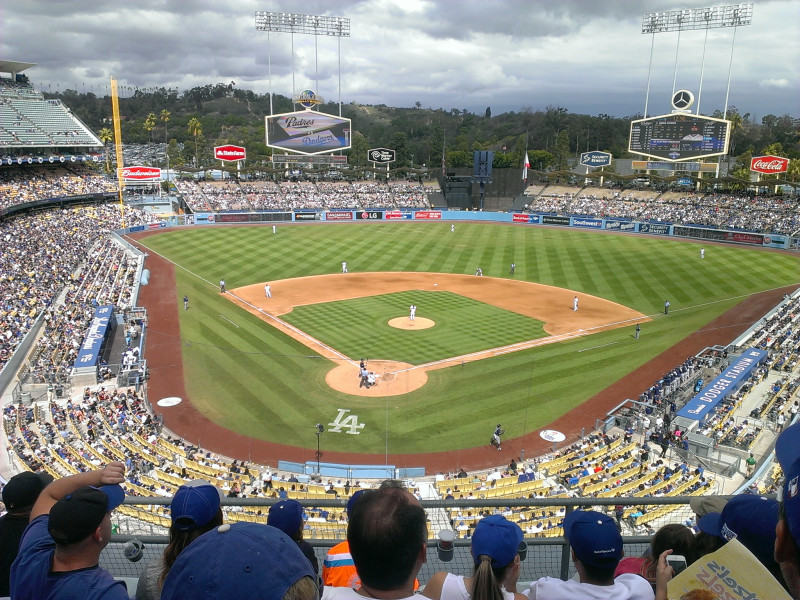Dodger Stadium, located in Los Angeles, California, is home to the Los Angeles Dodgers. Opened in 1962, it's MLB's oldest ballpark west of the Mississippi and third-oldest overall. Constructed in under three years for $23 million, it also boasts the largest seating capacity of any baseball stadium in the world. Known as a 'pitcher's ballpark,' Dodger Stadium has hosted 13 no-hitters, including two perfect games, making it a historic and significant venue in Major League Baseball.
1912: Fenway Park built
In 1912, Fenway Park in Boston opened. Dodger Stadium is the third-oldest ballpark overall, after Fenway Park, which opened in 1912.
1914: Wrigley Field Built
In 1914, Wrigley Field in Chicago opened. Dodger Stadium is the third-oldest ballpark overall, after Wrigley Field, which opened in 1914.
1949: Federal Housing Act
The land that would be used for Dodger Stadium had previously been seized from local owners by the city of Los Angeles, using eminent domain with funds from the federal Housing Act of 1949.
1953: Norris Poulson Elected Mayor
In 1953, Norris Poulson was elected mayor of Los Angeles, changing the local political climate and reducing support for public housing projects like Elysian Park Heights.
June 3, 1958: "Taxpayers Committee for Yes on Baseball" Referendum Approved
On June 3, 1958, Los Angeles voters approved a "Taxpayers Committee for Yes on Baseball" referendum, allowing the Dodgers to acquire 352 acres of Chavez Ravine from the city.
September 17, 1959: Groundbreaking for Dodger Stadium
Ground was broken for Dodger Stadium on September 17, 1959. Construction involved removing ridges and filling ravines to create a level surface.
1961: Dodgers Played at Los Angeles Memorial Coliseum
From 1958 through 1961, while Dodger Stadium was under construction, the Dodgers played at the Los Angeles Memorial Coliseum, which could seat over 90,000 people.
1962: Dodger Stadium Opens
Dodger Stadium opened in 1962 in the Elysian Park neighborhood of Los Angeles, California. It was constructed in less than three years at a cost of US$23 million.
1962: Home of the Los Angeles Angels
From 1962 through 1965, Dodger Stadium was also the home of the Los Angeles Angels.
1962: New Seats
In 1962 color scheme consisting of yellow, light orange, turquoise, and sky blue.
1962: Original Scoreboards Installed
In 1962, Dodger Stadium was originally equipped with two large Fair Play electronic scoreboard units above the left- and right-field pavilions, along with smaller auxiliary scoreboards at field level.
March 21, 1963: Sugar Ramos wins WBC and WBA featherweight titles
On March 21, 1963, Ultiminio "Sugar" Ramos won the WBC and WBA featherweight titles from Davey Moore in ten rounds. Moore died days after this fight. Roberto Cruz also won the WBA Junior Welterweight title.
1963: Dodgers win World Series
In 1963, the Dodgers won the World Series over the New York Yankees, sweeping the Yankees by winning game 4 by a score of 2–1.
1964: Jim Fregosi hits for the cycle at Dodger Stadium
In 1964, Jim Fregosi hit for the cycle in Dodger Stadium, one of only two players to achieve this feat in the stadium.
1965: Sandy Koufax throws perfect game
In 1965, Sandy Koufax of the Dodgers threw a perfect game at Dodger Stadium, one of two perfect games thrown at the stadium.
April 21, 1967: First Rainout
On April 21, 1967, the Dodgers experienced their first rainout at Dodger Stadium against the St. Louis Cardinals, ending a streak of 737 consecutive games without a postponement.
1968: Dodgers move diamond closer to center field
Following the 1968 "Year of the Pitcher," the Dodgers moved the diamond about 10 feet (3 m) towards center field, which was partially credited for generating 46 more home runs than the prior season.
August 5, 1969: Willie Stargell hits home run that clears right field pavilion
On August 5, 1969, Willie Stargell of the Pittsburgh Pirates hit a 507-foot home run off the Dodgers' Alan Foster that completely cleared the right field pavilion and struck a bus parked outside the stadium.
1969: Home plate moved closer to center field
In 1969, home plate was moved 10 feet (3.0 m) toward center field, but this also expanded foul ground by 10 feet (3.0 m).
1969: Distance to center field is 400 feet
Since 1969, the distance to center field has actually been 400 feet (120 m), even though it has been marked at 395 feet since 1973.
May 8, 1973: Willie Stargell hits home run onto right field pavilion roof
On May 8, 1973, Willie Stargell hit a 470-foot home run off Andy Messersmith that landed on the right field pavilion roof and bounced into the parking lot.
1973: 395-foot signs erected to the left and right of dead center
In 1973, two 395-foot (120 m) signs were erected to the left and right of dead center, though the actual distance to center field remained 400 feet (120 m).
1975: Seats in Use
The seats that were removed had been in use since 1975 and helped give the stadium its unique "space age" feel with a color palette of bright yellow, orange, blue, and red.
April 12, 1976: Second Home Rainout
On April 12, 1976, the second home rainout ended a streak of 724 straight games.
1979: Fleetwood Mac "Tusk" Music Video Filmed
In 1979, Fleetwood Mac's music video for the song "Tusk" was recorded and filmed at the empty stadium.
1980: Mitsubishi Electric Diamond Vision
In 1980, the left-field message board was replaced by a Mitsubishi Electric Diamond Vision video board.
1984: Summer Olympics Exhibition Baseball
Dodger Stadium hosted exhibition baseball during the 1984 Summer Olympics.
1984: Dodger Stadium hosts baseball competition of Summer Olympic Games
In 1984, Dodger Stadium hosted the baseball competition of the Summer Olympic Games.
April 21, 1988: Consecutive Rainouts
April 19–21, 1988 saw three consecutive rainouts, the only time consecutive games have been rained out at Dodger Stadium.
1988: Dodgers win Game 7 of NLCS
In 1988, the Dodgers won Game 7 of the National League Championship Series over the New York Mets, 6–0. It was the first time Dodger Stadium had hosted a seventh game of a postseason series.
1991: Dennis Martinez throws perfect game
In 1991, Dennis Martinez of the Montreal Expos threw a perfect game at Dodger Stadium, one of two perfect games thrown at the stadium.
1992: Games postponed due to Los Angeles riots
In 1992, baseball games from April 30 to May 3 against the Montreal Expos were postponed due to the 1992 Los Angeles riots. Three consecutive days of double headers were held later in the season on July 6 to 8.
July 16, 1994: The Three Tenors at Dodger Stadium
On July 16, 1994, The Three Tenors — José Carreras, Plácido Domingo and Luciano Pavarotti — gave a one-night-only show at Dodger Stadium as part of the celebrations for the 1994 FIFA World Cup. The event was watched by a billion people worldwide.
September 21, 1997: Mike Piazza hits home run onto left field pavilion roof
On September 21, 1997, Dodger catcher Mike Piazza hit a 478-foot home run off Frank Castillo of the Colorado Rockies that landed on the left field pavilion roof and skipped under the left field video board and into the parking lot.
1997: Dodger Stadium ranked as most pitcher-friendly park
According to MLB's park factor database, Dodger Stadium decreased offense by 6% from 1997 to 1999, making it the most pitcher-friendly park in MLB during this period. The park deflated doubles (by 21%) and triples (by 45%).
1998: Loge Scoreboards Installed
In 1998, the field-level auxiliary scoreboards were replaced by larger units installed on the facade of the Loge seating level.
April 11, 1999: Rainout Streak Ends
No rainouts occurred between April 21, 1988, and April 11, 1999 – a major league record of 856 straight home games without a rainout.
May 22, 1999: Mark McGwire clears left field pavilion with home run
On May 22, 1999, St. Louis Cardinals first baseman Mark McGwire cleared the left field pavilion with a 483-foot home run off the Dodgers' Jamie Arnold.
1999: Dodger Stadium ranked as most pitcher-friendly park
According to MLB's park factor database, Dodger Stadium decreased offense by 6% from 1997 to 1999, making it the most pitcher-friendly park in MLB during this period. The park deflated doubles (by 21%) and triples (by 45%).
1999: Original Dugout Seating Replaced
In a 1999 renovation, the original covered and screened dugout seating area was replaced by more conventional box seating.
April 17, 2000: No Rainouts
There have been no rainouts since April 17, 2000, 1,471 consecutive games through October 3, 2019.
2000: Oracle Park Opened
Oracle Park in San Francisco opened in 2000. It was the first Major League Baseball stadium since the initial construction of the original Yankee Stadium to be built using 100% private financing.
2001: Strobe Lights Added
In 2001, strobe lights were added to Dodger Stadium; they flash when the Dodgers take the field, after a home run, and after a win.
2003: LED Video Displays Upgraded
Between 2003 and 2005, Dodger Stadium upgraded with LED video displays.
2003: Field-Level Scoreboards Installed
In 2003, field-level out-of-town scoreboards were installed on the left- and right-field walls.
2004: Dodgers install high-priced field level seats
Following the 2004 season, the Dodgers' then-owner Frank McCourt installed 1,600 high-priced field level seats, shrinking Dodger Stadium's foul territory from 30,000 square feet to 20,000 square feet.
2005: Dodger Stadium is only MLB park never to increase seating capacity
As of 2005, Dodger Stadium was the only current MLB park that had never increased its seating capacity, due to a conditional-use permit that limited the seating capacity to 56,000.
2005: Major Renovations
At the conclusion of the 2005 season, the Los Angeles Dodgers made major renovations during the subsequent off-season.
2005: LED Video Displays Upgraded
Between 2003 and 2005, Dodger Stadium upgraded with LED video displays. The large main video display measures 27 feet (8.2 m) high by 47 feet (14 m) wide.
2005: MLB ranks Dodger Stadium as a balanced park
From 2005 to 2007, MLB ranked Dodger Stadium as a balanced park, with an exactly average park factor. The stadium continued to depress doubles and triples, but inflated walks by 7%.
2006: Video Ribbon Board Installed
In 2006, the Loge scoreboards were replaced by a video ribbon board.
2007: MLB ranks Dodger Stadium as a balanced park
From 2005 to 2007, MLB ranked Dodger Stadium as a balanced park, with an exactly average park factor. The stadium continued to depress doubles and triples, but inflated walks by 7%.
2008: Dodger Stadium returns to its status as a pitchers' park
From 2008 to 2010, Dodger Stadium returned to its original status as a pitchers' park, decreasing total offense by 7%.
2008: High attendance mark set during NLCS games
In 2008, Dodger Stadium had an attendance of 56,800 in Games 3, 4, and 5 of the NLCS, which was the high water mark since renovations.
2008: Beer sales reinstated in right field pavilion
In 2008, beer sales were reinstated in the right field pavilion after it was converted into the All You Can Eat Pavilion. Fans seated in that section could eat unlimited hot dogs and peanuts and also have access to free soft drinks, but there was a charge for beer.
2008: $412 Million Project Announced
In 2008, the Dodgers announced a $412 million project to build a Dodger museum, shops, and restaurants around Dodger Stadium.
2008: New Zip Code
In 2008, the Los Angeles City Council voted to give the Dodger Stadium area its own zip code, 90090, as of July 2009, and a new name, Dodgertown.
2008: Dodger Stadium becomes largest capacity ballpark in the Majors
In 2008, with the retirement of the original Yankee Stadium and Shea Stadium, Dodger Stadium became the largest capacity ballpark in the Majors.
2008: Renovations Planned
In the 2008–2009 off-season, the upper levels of Dodger Stadium were supposed to be renovated, including new concession stands, earthquake retrofitting, and replacement of scoreboards with HD monitors.
July 2009: Dodgertown Zip Code
As of July 2009, the Dodger Stadium area received its own zip code, 90090, and a new name, Dodgertown.
2009: Renovations Postponed
Due to the 2009 World Baseball Classic, the divorce of Frank and Jamie McCourt, and a weak economy, renovations planned for Dodger Stadium were put on hold.
2009: World Baseball Classic
In 2009, Dodger Stadium hosted the semifinals and finals of the World Baseball Classic.
2009: Orlando Hudson hits for the cycle at Dodger Stadium
In 2009, Orlando Hudson hit for the cycle in Dodger Stadium, one of only two players to achieve this feat in the stadium.
2009: Dodgers' home opener draws largest crowd in stadium history
In 2009, the Dodgers' home opener drew 57,099 fans through the sale of standing room only tickets, which was the largest crowd in stadium history.
2009: Dodger Stadium becomes only stadium with symmetrical outfield dimensions in the National League
In 2009, with the opening of Citi Field and the demolition of Shea Stadium, Dodger Stadium became the only stadium with symmetrical outfield dimensions remaining in the National League.
2010: Dodger Stadium has club seats and luxury suites
As of 2010, Dodger Stadium had 2,098 club seats and 68 luxury suites. These amounts were expected to increase after renovations, while still complying with the conditional-use permit.
2010: Dodger Stadium returns to its status as a pitchers' park
From 2008 to 2010, Dodger Stadium returned to its original status as a pitchers' park, decreasing total offense by 7%.
2012: Renovations reduce maximum capacity of Dodger Stadium
Due to renovations made in the 2012-2013 offseason, the maximum capacity of Dodger Stadium was less than 56,000, although the team's president, Stan Kasten, did not provide an exact number.
2012: Renovation Efforts Led by Janet Marie Smith
Following the sale of the Dodgers in 2012, Janet Marie Smith led renovations to Dodger Stadium, including new video boards, clubhouses, and improved restrooms and concession stands.
August 3, 2013: Soccer Tournament
On August 3, 2013, Dodger Stadium hosted a soccer tournament featuring the Los Angeles Galaxy, Real Madrid, Everton, and Juventus.
2013: Renovations Put in Place
Between the 2013 and 2014 seasons, more renovations were put in place at Dodger Stadium, including wider concourses in the pavilions, new restaurants, team store buildings, and bullpen overlooks.
2013: Renovations Completed for the Season
Extensive renovations to Dodger Stadium were completed for the 2013 season, including new HD video boards, a sound system, wider concourses, and a children's playground.
2013: Capacity of Dodger Stadium reported as 56,000
In 2013, the team's media guide and website continued to report the capacity of Dodger Stadium as 56,000, despite renovations made in the 2012-2013 offseason.
January 25, 2014: Dodger Stadium hosts NHL game and KISS performs
On January 25, 2014, Dodger Stadium hosted its first National Hockey League game between the Los Angeles Kings and the Anaheim Ducks as part of the 2014 NHL Stadium Series. The Ducks won the game 3–0, and the rock band KISS played songs before the game and during its first intermission.
2014: Renovations Put in Place
Between the 2013 and 2014 seasons, more renovations were put in place at Dodger Stadium, including wider concourses in the pavilions, new restaurants "Think Blue Bar-B-Que" and "Tommy Lasorda's Trattoria", team store buildings replacing the tents that previously served as team stores, bullpen overlooks with overlook bars, and tree relocation at the top of the stadium.
2014: NHL Stadium Series Game
In 2014, the Los Angeles Kings and Anaheim Ducks played a regular season game in Dodger Stadium as part of the NHL Stadium Series.
May 12, 2015: Giancarlo Stanton hits home run over left field roof
On May 12, 2015, Giancarlo Stanton of the Miami Marlins hit a 478-foot home run over the left-field roof off Mike Bolsinger.
November 15, 2015: Dodger Stadium hosts Cricket All-Stars Series game
On November 15, 2015, Dodger Stadium hosted the third and final game of the Cricket All-Stars Series 2015, featuring retired cricket players led by Sachin Tendulkar and Shane Warne. Warne's Warriors defeated Sachin's Blasters by 4 wickets.
April 15, 2017: Jackie Robinson Statue Unveiled
On April 15, 2017, the Dodgers unveiled a bronze statue of Jackie Robinson in the stadium's left-field plaza, marking the 70th anniversary of Robinson's major league debut. The statue was made by sculptor Branly Cadet.
2017: Dodgers lose Game 7 of World Series to Astros
In 2017, the Dodgers lost Game 7 of the World Series to the Houston Astros, 5-1. It was the first time Dodger Stadium had hosted a seventh game of the World Series.
2017: Researchers analyze the marine layer effect on fly ball distance
In 2017, two researchers concluded that while the marine layer has a statistically significant effect on flyball distance in Petco Park and Oakland Coliseum, the effect size is around six feet, and Dodger Stadium's marine layer effect was close to zero.
2018: FanGraphs notes many teams shrinking foul territory
In 2018, FanGraphs noted that many other teams had been shrinking their foul territory, although Dodger Stadium still had less foul territory than most MLB ballparks.
2018: Blue Strobe Lights Added
In 2018, blue strobe lights were added to Dodger Stadium.
July 13, 2019: Paul McCartney Freshen Up Tour
On July 13, 2019, Paul McCartney performed at Dodger Stadium as part of his Freshen Up tour, with Ringo Starr and Joe Walsh as guest performers.
July 23, 2019: $100 Million Renovation Presentation
On July 23, 2019, a press conference was held to present the $100 million renovation to Dodger Stadium, including a center field plaza, children's playground, and relocation of the Jackie Robinson statue.
October 3, 2019: Consecutive Games Without a Rainout
Through October 3, 2019, Dodger Stadium had a major league record of 1,471 consecutive home games without a rainout since April 17, 2000.
2020: Dodger Stadium hosts ALDS games
In 2020, Dodger Stadium hosted all games between the Houston Astros and the Oakland Athletics in the American League Division Series due to MLB scheduling postseason games for neutral, "bubble" sites.
2020: Dodger Stadium hosts drive-in viewing for World Series games
In 2020, during the World Series between the Dodgers and the Tampa Bay Rays, Dodger Stadium staff set up two 60 ft HD video screens in the parking lot and allowed up to 950 cars to enter for each game, charging $75 per car. Audio play-by-play was broadcast over an FM station.
2020: Sandy Koufax Statue Relocation
In 2020, the Jackie Robinson Statue was moved to centerfield plaza as part of renovations.
2020: Renovations Completed and Koufax Statue Delayed
While the renovations were completed during the delayed 2020 season, due to the COVID-19 pandemic, the unveiling of Sandy Koufax's statue was delayed two years.
September 30, 2021: Fernando Tatis Jr. hits ball out of Dodger Stadium
On September 30, 2021, Fernando Tatis Jr. hit a ball out of Dodger Stadium off the top of the left field pavilion roof.
November 8, 2021: Dodgers Announce 2021 Holiday Festival
On November 8, 2021, the Dodgers announced the "2021 Dodger Holiday Festival" event, which included an ice skating rink, scenic and light displays, food and beverages, and photos with Santa Claus. The event was held most nights from November 26 to December 31.
June 18, 2022: Sandy Koufax Statue Unveiled
On June 18, 2022, the Dodgers unveiled a bronze statue of Sandy Koufax in the centerfield plaza, next to the statue of Robinson. The sculpture was also made by Cadet.
September 11, 2022: Lady Gaga Chromatica Ball Concert Filmed
Lady Gaga's sold-out concert at Dodger Stadium on September 11, 2022, as part of The Chromatica Ball (2022), was filmed for a concert film.
2022: Dodger Stadium has high home run park factor at night
From 2022 to 2024, Dodger Stadium's night-game home run park factor was 126 (i.e., the stadium inflated home runs by 26%), the second-highest in MLB.
2022: Dodger Stadium ranked as a balanced park by MLB
From 2022 to 2024, MLB ranked Dodger Stadium as a balanced park once again. The stadium depresses walks and most types of hits but inflates home runs by 22%.
July 21, 2024: Shohei Ohtani hits home run out of Dodger Stadium
On July 21, 2024, Shohei Ohtani hit a ball 473 feet out over the right field pavilion into the center field plaza.
2024: Dodgers clinch a World Series at Dodger Stadium
As of the 2024 season, the 1963 World Series win remains the only time the Dodgers ever clinched a World Series at Dodger Stadium.
2024: Dodger Stadium achieves record attendance
Dodger Stadium achieved record paid attendance during the 2024 season with 3,941,251 spectators.
2024: Dodger Stadium has high home run park factor at night
From 2022 to 2024, Dodger Stadium's night-game home run park factor was 126 (i.e., the stadium inflated home runs by 26%), the second-highest in MLB.
2024: BetMGM states Dodger Stadium has third-shortest centerfield distance
In 2024, BetMGM stated that Dodger Stadium's 395-feet centerfield distance was the third-shortest in baseball, behind only Fenway Park and Oracle Park.
2024: Cost Adjusted for Inflation
In 2024, the original 1962 cost of Dodger Stadium's construction, US$23 million, is equivalent to US$239 million when adjusted for inflation.
October 8, 2025: Kyle Schwarber hits home run off of Dodgers starter
On October 8, 2025, Kyle Schwarber of the Philadelphia Phillies hit a home run off of Dodgers starter Yoshinobu Yamamoto during the 3rd game of the NLDS, which hit the roof of the right field pavilion.
October 17, 2025: Shohei Ohtani hits another home run out of Dodger Stadium
On October 17, 2025, Shohei Ohtani hit another home run out of Dodger Stadium, off of Chad Patrick of the Milwaukee Brewers during the 4th game of the NLCS, which also hit the roof of the right field pavilion on its way out.
2025: Center field distance indicated at straight away center field
As of 2025, the center field distance of 395 feet (120 m) is indicated at straight away center field.
2028: Dodger Stadium to host baseball at 2028 Olympic Games
Dodger Stadium is designated to host baseball for the 2028 Olympic Games.
Mentioned in this timeline

Lady Gaga born Stefani Joanne Angelina Germanotta is a highly...
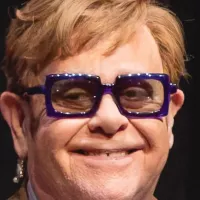
Sir Elton John is a highly successful British singer songwriter...
Home Box Office HBO is an American pay television service...
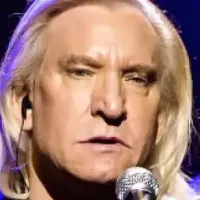
Joseph Fidler Walsh known as Joe Walsh is a highly...

Shohei Ohtani is a Japanese professional baseball player for the...
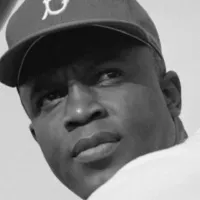
Jackie Robinson was an American professional baseball player who broke...
Trending
57 minutes ago West Indies Defeat Bangladesh in T20I; Powell Celebrates Century; Umpire Controversy Arises.
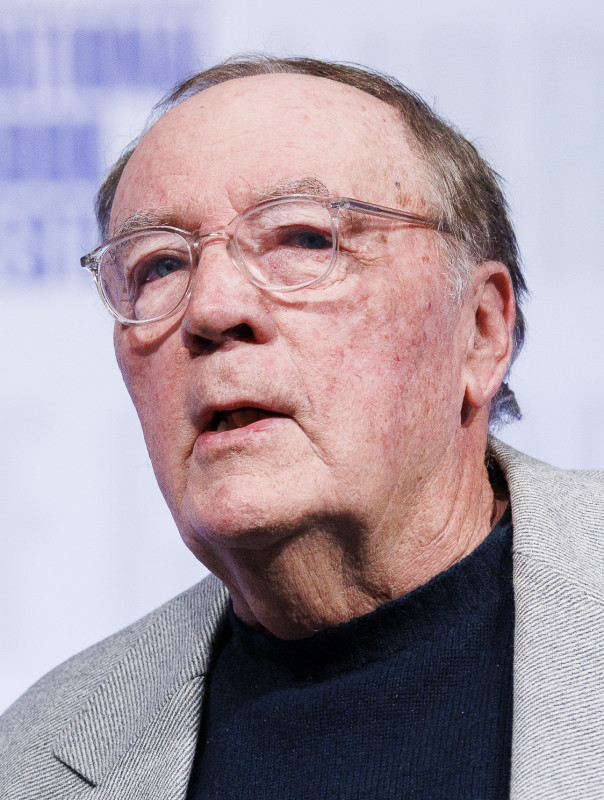
James Patterson is a prolific American author best known for his thriller and crime novels including the Alex Cross and...
2 hours ago Next-Gen Xbox Rumored: Full Xbox Library, Windows PC Gaming, Steam, and PlayStation Compatibility.
2 hours ago Fed Expected to Cut Interest Rates Amid Job Market Weakness: October Meeting
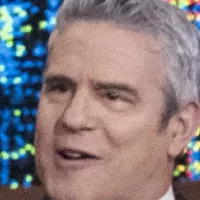
3 hours ago Andy Cohen's Son Ben Hates Elsa; Kristen Bell Reacts to the Frozen Opinion.

17 days ago Jessica Alba, 44, stuns fans with toned figure, new hair, and red carpet debut.
Popular
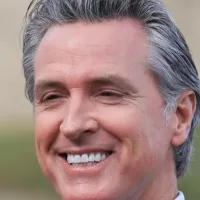
Gavin Newsom is an American politician and businessman currently serving...

The White House located at Pennsylvania Avenue NW in Washington...

George Soros is a Hungarian-American investor and philanthropist with a...

Doug Ford is a Canadian politician and businessman currently serving...

XXXTentacion born Jahseh Dwayne Ricardo Onfroy was a controversial yet...

Bernie Sanders is a prominent American politician currently serving as...
